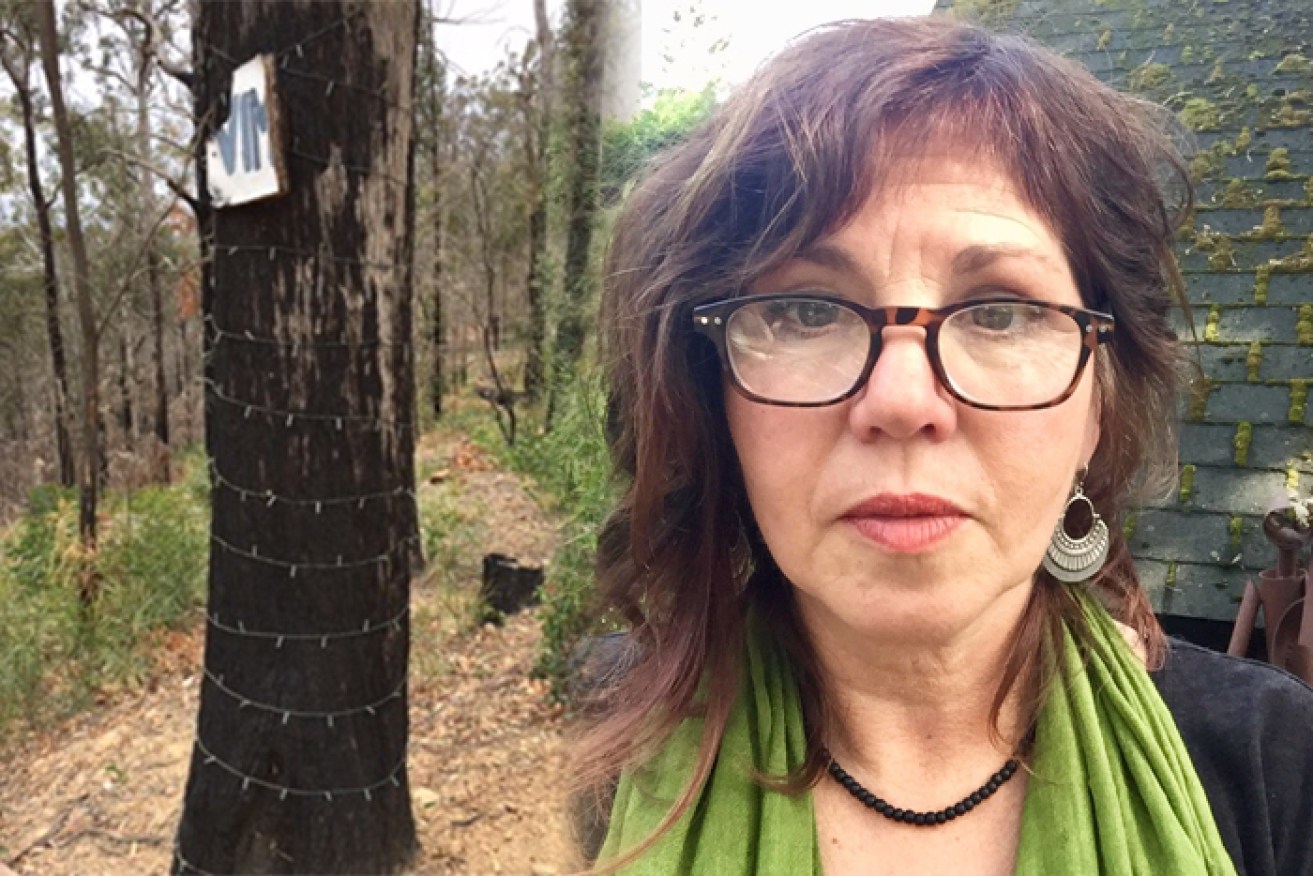Impacted by drought or bushfires? How to find hope for Christmas and beyond


Jo Dodds had a changed mentality every time she drove past a set of flashing Christmas lights. Photo: Supplied
Wrapping a string of flashing Christmas lights around the trunk of a blackened tree could seem like an insignificant gesture in a town reeling from catastrophic bushfires.
Not for Bega Valley Shire Councillor Jo Dodds, who for the past 21 months has been “begging” politicians to urgently address climate change.
Since “nothing has been done” to help her bushfire-affected community “feel more hopeful that we’re moving towards a safer future”, Ms Dodds said she’s relied on sparkly fairy lights for some “glimmer of hope”.
But with no end in sight to the country’s drought and bushfire crisis, it’s never been a more important time for affected Australians to start building their “hope muscles”, clinical psychologist Ruth Nelson said.
Something as small as wrapping a few fairy lights around some run-down trees can have a significant impact.
During her “very lonely” trips home from work, Ms Dodds drives down a dirt road through a dark forest that has no street lighting.
After a bushfire ripped through the New South Wales town of Tathra in March last year and destroyed 69 homes, flashing Christmas lights were wrapped around the trunks of two trees damaged by the blaze.
Fortunately for Ms Dodds, they are located at an intersection near her home.

The lights have stayed up 21 months after they were first hung. Photo: Supplied
“It always caught me off guard and it always made me smile, no matter how low I was feeling.”
She said the fact that someone made the effort to lighten up a section of the fire-damaged forest has “absolutely given me the courage to go on”.
But “while there’s hope”, Ms Dodds said “we feel like we’re the only ones creating that hope”. It certainly hasn’t come from the top down.
‘Hope is a skill set’
There are many other different ways to grow your hope, especially during Christmas – a time when people start feeling overwhelmed by societal expectations to be thoroughly happy.
Even if the worst has subsided for you, the threats posed by drought and bushfires are ongoing, clinical psychologist Ruth Nelson said. This can cause negative feelings such as fear or despair to linger.
Compounded by the “normal expectations of the relentless need to be happy at Christmas”, people’s “thoughts can really get out of control quite quickly”, she said.
Let go of any unrealistic expectations about how you should be feeling during Christmas. Then ask yourself, “what does Christmas mean to me?”

Ms Nelson’s advice for building hope is to take repeated action. Photo: Supplied
For many, it’s about connecting to family and community, Ms Nelson said.
“There’s joy in seeing open clear skies. There’s joy in seeing the water. There’s joy in seeing family members coming together.”
Lean into these feelings, then “accept these are very uncertain times and know there is something you can do,” she said.
“When we feel like we can’t do anything, that’s when we get really traumatised because what we value so deeply – home and community – is under threat and we can’t protect it.”
To overcome feeling powerless, take actions – no matter how small – that build hope.
“Hope is not a feeling, hope is a skill set. It’s like a set of muscles that you have to practise daily and you have to move to practise them,” Ms Nelson said.
Some suggestions:
- Donate to your local fire service
- Google “local climate change groups”. You will find people nearby who share your worries and are finding ways of taking meaningful action.
- Divest from institutions that profit from fossil fuel
- Attend climate change rallies
- Contact your local, state and federal members via email and ask what they are doing to ensure emissions are reduced. Follow up with them via email and phone. Ring their office and book an appointment to go and ask them in person.
- Reduce your emissions – where possible, walk or cycle more, use public transport and drive less.
- Advocate for people who have less opportunity than you to speak up. Farmers who are hand-feeding stock don’t have time to lobby for financial support to switch to sustainable agriculture. If you are from an urban area, connect with rural climate actions and see what help they need.
If that all sounds daunting, Ms Nelson said to do them with other people.
That will “protect ourselves against emotional exhaustion … build our community and individual resilience” and ultimately help you find meaning and purpose.
As long as you keep taking “little actions that build hope for you and hope for the future of your community”, you won’t just survive this Christmas, but you’ll “come out stronger and healthier”, Ms Nelson said.








